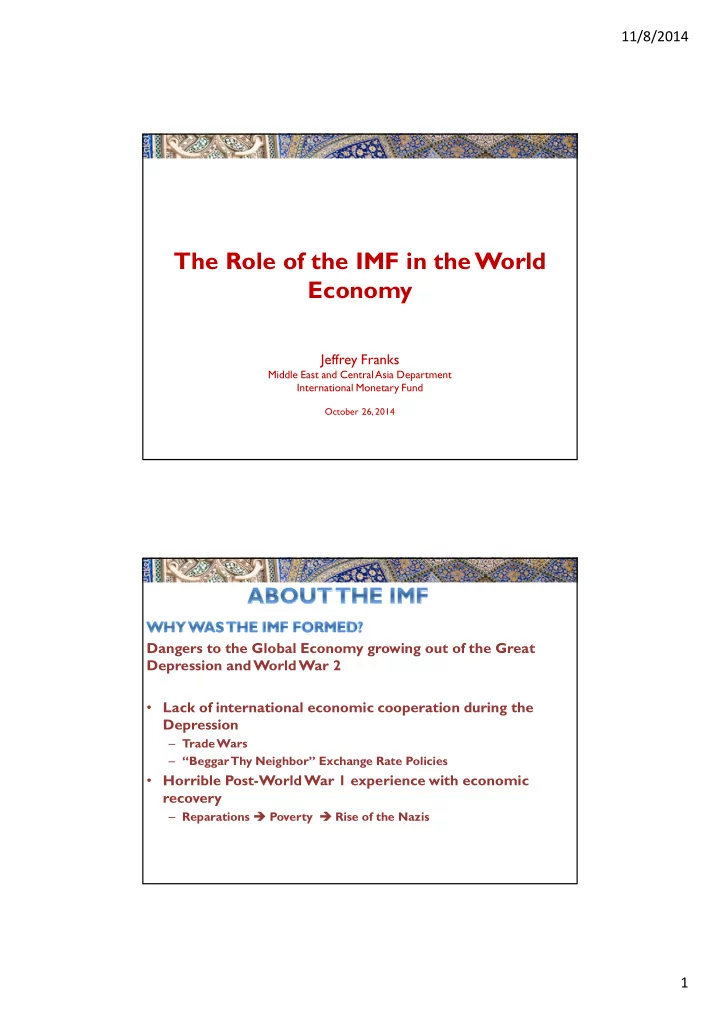

11/8/2014 The Role of the IMF in the World Economy Jeffrey Franks Middle East and Central Asia Department International Monetary Fund October 26, 2014 Dangers to the Global Economy growing out of the Great Depression and World War 2 • Lack of international economic cooperation during the Depression – Trade Wars – “Beggar Thy Neighbor” Exchange Rate Policies • Horrible Post-World War 1 experience with economic recovery – Reparations Poverty Rise of the Nazis 1
11/8/2014 Dangers to the Global Economy growing out of the Great Depression and World War 2 • Lack of international economic cooperation during the Depression – Trade Wars – “Beggar Thy Neighbor” Exchange Rate Policies • Horrible Post-World War 1 experience with economic recovery – Reparations Poverty Rise of the Nazis • The Big Idea: • Form 3 international organizations to tackle the expected major global economic problems: – The IMF, to tackle stability of the global economy and deal with exchange rate issues – The World Bank, to deal with reconstruction after the war and development for poor countries – The World Trade Organization, to prevent trade wars and liberalize the trade regime. 2
11/8/2014 • 44 founding members (Including Iran) • Owned by the member countries, with voting rights according to contributions. – US has ~17% of votes – Iran has 0.7% (~US$ 2.25 billion in Quota) • Governed by Board of Directors (24 from member countries or groups of countries) – Director for Iran, Jafar Mojarrad 1. SURVEILLANCE- Keep watch over the stability of the Global economy and the macroeconomic stability of each member state. - Includes economic forecasting - Research - Annual (Article IV) Assessments of each economy 2. CAPACITY BUILDING- Training and T echnical Assistance – Provides T echnical advice through ST missions and LT experts. – Provides training courses for public officials 3
11/8/2014 3. ASSISTANCE PROGRAMS FOR COUNTRIES WITH SERIOUS ECONOMIC IMBALANCES. – Different loan arrangements according to country’s needs and level of economic development. Most prominent: • Stand-By Arrangement (SBA) • Extended Fund Facility (EFF) • Poverty Reduction and Growth Facility (PRGF) – IMF provides loans when others will not, and helps catalyze support from other insitutions and the private sector. – Iran’s last SBA ended in 1962 • FISCAL IMBALANCE: Deficit is too large and cannot be financed • EXTERNAL IMBALANCE: Current account deficit is too large to be financed (or major capital account outflows which cannot be sustained). • MONETARY “IMBALANCE”: Central bank policy generates too much money supply growth, producing an inflationary spiral. 4
11/8/2014 • Government may not be able to mobilize adequate tax resources. • The country may not be able to generate sufficient growth to maintain employment • The country may not generate sufficient productivity growth to compete in world markets. • Etc. • Cut spending • Raise revenues • Get more financing (temporary solution) • Cut Imports • Raise Exports • Get more capital inflows (or less outflows) • But how? 5
11/8/2014 • Reduce demand pressure • Raise interest rates • Reduce money supply growth • Provide money to help cushion the Reduce demand pressure pain of the fiscal/external/monetary adjustments – More money = more time to adjust – More money = smaller reductions in growth and employment • Provide advice and technical assistance on the design and implementation of adjustment policies. • Promote structural reforms to boost medium-term economic performance. 6
11/8/2014 • Unrealistic hope that country can continue to live beyond its means. • Painful medicine Blame the Doctor • Belief that IMF policy advice is wrong. • Are there other (less painful) ways to fix the problems? – Heterodox economic policies: control markets causing difficulties and try to artificially stimulate growth. E.g. capital controls, price controls, fiscal stimulus financed by money creation. – “Supply-side” economics: cut taxes and stimulate growth to “grow your way out of the problem – Structural reform can help a lot, but takes time. • Stylized Facts: • Iran has a relatively low fiscal deficit, – but taxation in very low and spending is relatively low by international standards. • Inflation has been a big problem for the economy • External balance has been in surplus, but even this has been hard to sustain due to sanctions. Huge drop in surplus mimics balance of payments crisis. • Growth has been substandard for many years. Living standards are not growing by much, despite strong investment. Economy has low productivity growth. 7
11/8/2014 • Iran will not likely ever have another IMF program, for both economic and political reasons. • But, does the country need its own “stabilization and growth program”? • Need to address: – Low growth – High inflation – Difficult external position • Let’s discuss! THANK YOU! THANK YOU! 8
Recommend
More recommend